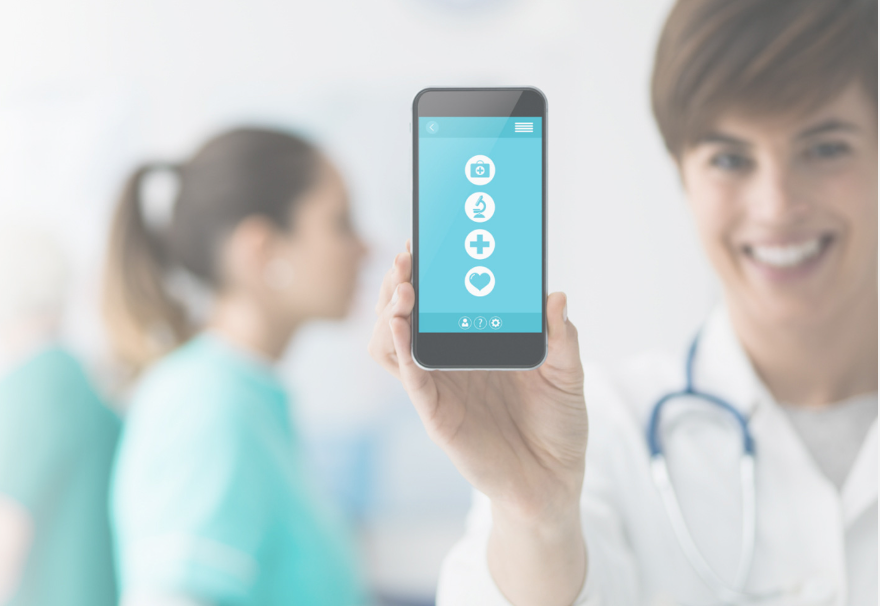Blog posts
Digitalization in the healthcare sector in Germany: current status
Published on 14 April 2024

The Digital Act (DigiG), which came into force on March 26, 2024, brings with it fundamental innovations
in the provision of digital solutions, such as the introduction of the electronic patient file (ePA)
and the e-prescription as well as telemedical services.
A central concern of the DigiG is also to promote the further development of care with digital health
applications (DiGA) on a health insurance certificate, i.e. the costs are covered by the health insurance
company. DiGAs are to be better integrated into care processes and also enable more complex treatment processes.
The digital health application (DiGA) and the digital care application (DiPA): the future of healthcare
In an era where digitalization is permeating all aspects of our lives, it is no surprise that healthcare is also affected. The introduction of digital applications in healthcare has the potential to transform the way patients are cared for and improve access to quality healthcare. Two important concepts that have emerged as part of this development are the Digital Health Application (DiGA) and the Digital Care Application (DiPA).

What is a DiGA digital health application?
Digital health applications (DiGA) are specialized software applications designed to support medical diagnoses, treat diseases or improve healthcare. These applications can include a wide range of functions, from monitoring health parameters and assisting with medication adherence to promoting healthy behaviors. Digital health applications (DiGA) open up a wide range of possibilities to support the detection and treatment of diseases as well as the path to a self-determined, healthy lifestyle. DiGAs are therefore "digital helpers" in the hands of patients. There is a list of such DiGAs that can be prescribed by prescription at the expense of statutory health insurance companies.

https://gesund.bund.de/digitale-gesundheitsanwendungen-diga
https://www.bfarm.de/DE/Medizinprodukte/Aufgaben/DiGA-und-DiPA/DiGA/Wissenswertes/_artikel.html
https://diga.bfarm.de/de/verzeichnis
What is a digital care application (DiPA)?
Digital care applications (DiPA) open up a wide range of possibilities to reduce impairments to the independence or abilities of the person in need of care or to counteract a worsening of the need for care. DiPAs are designed to improve the care and support of people, whether at home, in care homes or in other facilities. Communication with caregiving relatives and care professionals can also be improved through the use of DiPAs. DiPAs are therefore "digital helpers" that can be used by people in need of care or in the interaction between people in need of care and relatives, other voluntary carers or outpatient care facilities.
https://www.bfarm.de/DE/Medizinprodukte/Aufgaben/DiGA-und-DiPA/DiPA/Wissenswertes/_node.html
The idea behind DiPA
After the Digital Health Applications (DiGA) have already provided a relevant impetus for the digitalization of healthcare, the (medical) products brought into long-term care as DiPA are now also intended to systematically advance the innovation potential in care in Germany. The provision of DiPA is intended to contribute to a high-quality home care situation for those in need of care and their impaired independence or abilities within the meaning of long-term care insurance law that is adapted to their individual circumstances and needs. In addition, DiPAs are also intended to support family caregivers or other volunteer caregivers in providing assistance to those in need of care, thus helping to stabilize the situation at home. The concept of DiPA and the application process are based on the principle that digital applications must be both secure and easy to use if they are to be successfully established in long-term care, and therefore aims in particular to build a bridge between data protection and data security on the one hand and user-friendliness and performance on the other.
Authorization and regulation
The approval and regulation of DiGA and DiPA vary from country to country. In Germany, for example, DiGAs are
subject to approval by the Federal Institute for Drugs and Medical Devices (BfArM). For an application to be
approved as a DiGA, it must prove that it offers medical benefits and safety for patients. In addition, DiGAs
must comply with certain data protection and safety standards.
The approval of DiGA and DiPA is subject to different requirements than those for medical devices.
DiPAs are similarly regulated by the health authorities and must also meet certain quality and safety
standards. A solid data protection structure is also crucial here, especially when it comes to the storage
and exchange of sensitive health data.
Advantages of DiGA and DiPA
The introduction of DiGA and DiPA offers numerous advantages for patients, family caregivers and nursing staff. The most important advantages include:
- Improved accessibility: Digital applications enable patients to access healthcare services anytime and anywhere, which is particularly beneficial for people with limited mobility or in rural areas.
- More efficient care: DiGA and DiPA can help to optimize the care process and increase the efficiency of healthcare.
- Better patient care: By continuously monitoring health parameters, DiGA and DiPA can detect early signs of complications, enabling timely intervention. This can help improve health outcomes and reduce hospitalizations.
- Patient self-management: Digital applications give patients more control over their health by providing them with tools to monitor their health, track their treatment plan and communicate with their care providers.
Challenges and outlook
Despite the many benefits that DiGA and DiPA offer, there are also some challenges that need to be overcome.
These include privacy concerns, the need for adequate training of patients and caregivers in the use of
digital applications and the integration of these applications into existing healthcare systems.
Nevertheless, DiGA and DiPA are expected to play an increasingly important role in healthcare in the future.
As technology and regulation continue to evolve, these digital applications will increasingly help to improve
healthcare, optimize patient care and ultimately improve the quality of life for millions of people worldwide.
 This project has received funding from the European Union’s
Horizon 2020 research and innovation programme under grant
agreement No 945169
This project has received funding from the European Union’s
Horizon 2020 research and innovation programme under grant
agreement No 945169